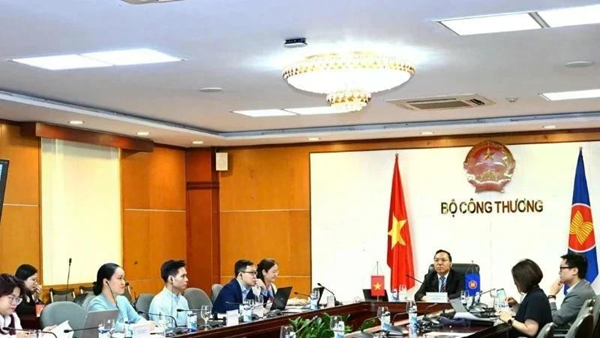Việt Nam supports ASEAN's stance in developing comprehensive, flexible, and practical strategic approach to strengthen intra-bloc economic autonomy while enhancing economic connectivity with key partner nations.

HÀ NỘI — Việt Nam supports ASEAN's stance in developing comprehensive, flexible, and practical strategic approach to strengthen intra-bloc economic autonomy while enhancing economic connectivity with key partner nations to effectively address current global challenges, Deputy Minister of Industry and Trade Nguyễn Hoàng Long has said.
He made the statement while attending the virtual special consultation meetings between ASEAN Economic Ministers and their counterparts from China, Australia-New Zealand, and Japan on Tuesday.
Long addressed US reciprocal tariff measures, emphasising Việt Nam’s responsive, cooperative approach grounded in proactive dialogue. He affirmed that Việt Nam seeks balanced, mutually beneficial solutions with the US. He highlighted the nation's commitment to maintaining a healthy international cooperation environment in line with WTO regulations and existing trade commitments.
Negotiations between the two sides are underway to resolve the trade issues, he said, affirming Việt Nam's commitment to continued close coordination with ASEAN and partner countries to identify cooperation opportunities in potential areas of mutual interest, including effectively leveraging the ASEAN-China Free Trade Agreement (ACFTA 3.0) and the Regional Comprehensive Economic Partnership (RCEP) to address current challenges and work towards a transparent, stable, and fair international trade environment.
Discussions at the meetings centred on developing strategic approaches to navigate the current economic instabilities affecting the region. The ASEAN ministers discussed ways to bolster economic, trade, and investment cooperation between the bloc and partner countries to better respond to global challenges. They explored ways to transform obstacles into opportunities, maintain regional supply chain stability, protect mutual interests, and mitigate negative impacts on businesses and citizens.
The ministers adopted three joint statements, signaling a united stance on current trade dynamics. They pledged to strengthen economic cooperation through free trade agreements and to pursue priority sectors of mutual interest, while reaffirming their dedication to a multilateral trading system that is rules-based, non-discriminatory, open, inclusive, fair, and transparent – the principles seen as the cornerstone of global trade. — VNS





